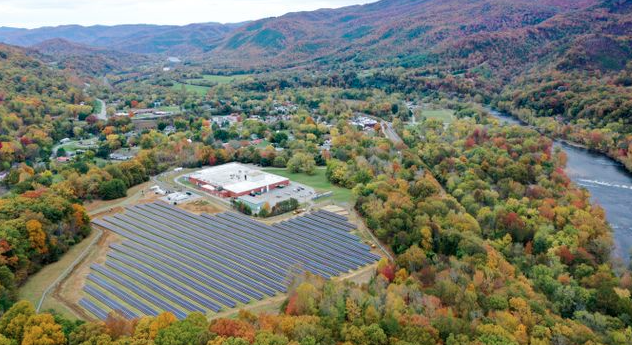
Duke Energy's Hot Springs microgrid consists of a 2 MW (AC) solar facility and a 4.4 MW lithium-based battery storage facility. During its testing phase, Duke Energy’s microgrid was able to pick up the town’s entire load from a black start without any help from the energy grid. (Courtesy: Duke Energy)
A microgrid has been placed into service in the town of Hot Springs, North Carolina that will be able to power the entire town during an outage.
The Hot Springs microgrid consists of a 2 MW (AC) solar facility and a 4.4 MW/4.4 MWh lithium-based battery storage facility. While the battery only technically has a 1-hour duration, the town's typical load is typically less than 1 MW, potentially extending the battery's available duration to at least four hours.
In addition to providing clean and reliable energy for the town of Hot Springs, the microgrid will also perform grid services, such as frequency and voltage regulation, as well as ramping support and capacity during peaks on Duke Energy's system.
“Duke Energy has numerous smaller microgrids on our system, but this is our first microgrid that can power an entire small town if its main power line experiences an outage,” said Jason Handley, general manager of Duke Energy's Distributed Energy Group.
Hot Springs has a population of just over 500. The town has limited rerouting options in the event of an outage.
During its testing phase, Duke Energy’s microgrid was able to pick up the town’s entire load from a black start without any help from the energy grid – using only solar and battery storage to restore power. The microgrid served the town’s load while the company gathered data.
Duke Energy worked with the technology company Wärtsilä, which supplied the battery energy storage system for the project. The microgrid utilizes Wärtsilä’s energy management system, the GEMS Digital Energy Platform, for integrated control of both the solar and energy storage facilities.
Duke Energy has over 60 MW of microgrid capacity connected throughout its regulated areas.
In Asheville, North Carolina, Duke Energy operates a 9 MW lithium-ion battery system at a substation site in the Rock Hill community.
In Haywood County, North Carolina the company has a 3.8- kWh lithium iron phosphate battery and 10 kW solar DC microgrid installation serving a communications tower on Mount Sterling in the Smoky Mountains National Park.